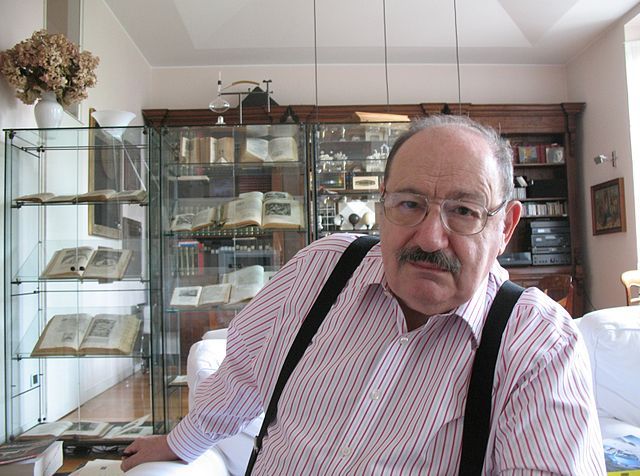Umberto Eco, an intellectual of another time
Umberto Eco was considered one of the leading Italian intellectuals of the second half of the twentieth century, he was a semiotician, philosopher, and writer.

On January 5, 1932, in Alessandria, a city in northern Italy, Umberto Eco became one of the thirteen children of Giovanna Bisio and Giulio Eco. He lived there until World War II when he had to move with his mother to a town in the same Piedmontese region for security reasons.
At the end of his secondary studies, and under pressure from his parents, Umberto settled in Turin to study law, but his parents' mandate was short-lived. Following his intellectual instinct, Eco abandoned law and began to study medieval literature and philosophy, disciplines in which he became an expert and which he exploited to the maximum to set his future novels.
His intellectuality was beginning to stand out. At the age of 22, in 1954, he received his doctorate after presenting a thesis on one of the most influential medieval philosophers in history: the friar and theologian Saint Thomas Aquinas. Two years later, that thesis would become his first published book: The Aesthetic Problem in St. Thomas (1956).
However, in matters of faith, Umberto Eco stopped believing in God during his university years, a fact that naturally distanced him from the Roman Catholic Church. During that period, his first essays appeared: Minimal Diary in 1963 (written in a satirical tone and continued in 1992) and other fundamental works such as Apocalyptic and Integrated (1965), The Absent Structure (1968), A Theory of Semiotics (1976), A Semiotic Overview (1979) or In Search of the Perfect Language (1995).
The Name of The Rose
In 1978 Umberto Eco began writing his first novel. He was 46 and it took him two years. The Name of the Rose was published in 1980 and was a success in sales, criticism, and prestige. In addition to being an intellectual, Eco became a renowned writer. Six years after his appearance, director Jean-Jacques Annaud released a movie based on the book starring Sean Connery. And in May 2020, the StarzPlay platform featured the work with an eight-episode series, based on an adaptation directed by Guancomo Battiato and starring John Turturro.
Acknowledgments
Umberto Eco was awarded honorary doctorates by 25 universities around the world, including the Complutense University of Madrid (1990), Tel Aviv University (1994), Athens University (1995), Warsaw University (1996), Castilla-La Mancha University (1997), and the Free University of Berlin (1998). His career also boasts numerous awards and decorations, such as the French Legion of Honor, the Prince of Asturias Award, the Gold Medal for Merit in Culture and Art (1997), Knight Grand Cross of the Order of Merit of the Italian Republic (1996), the Austrian State Prize for European Literature, the Gold Medal of the Circle of Fine Arts and others. He was also nominated several times for the Nobel Prize.
Source: Alessandro Bianchi, rector of the Mediterranean University of Reggio Calabria, awarded Umberto Eco the degree of Doctor Honoris Causa in Architecture (2005).




